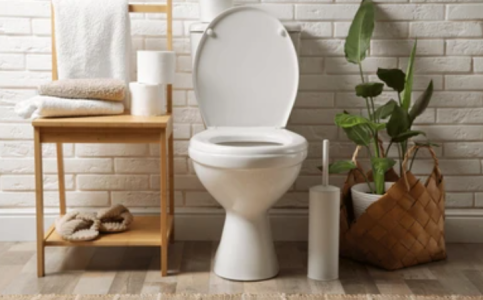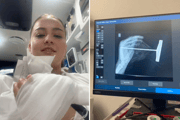Are you risking deadly infections every time you use a friend's bathroom? One woman's terrifying story will make you think twice
By
Gian T
- Replies 0
We all know the old saying: 'It’s better to be safe than sorry.' But how often do we really think about that when it comes to something as simple as using a friend’s bathroom? For most of us, it’s just a quick pit stop—wash your hands, maybe check your hair, and off you go. But for one young woman, a seemingly innocent trip to a friend’s loo turned into a year-long medical nightmare that nearly cost her her life.
Let’s dive into Mars’ story—a cautionary tale that’s as eye-opening as it is unsettling, and a timely reminder for all of us (especially those of us who remember when handwashing was drilled into us at school) about the importance of hygiene, vigilance, and not taking our health for granted.
Mars, a 20-year-old from Newport News, Virginia, was working an overnight shift at a Walmart distribution centre when she was suddenly struck by a pain so severe she could barely stand. Thinking it might be something like an ovarian cyst or even appendicitis, she rushed to the hospital. But after a battery of tests, doctors simply told her she was 'fighting a virus' and sent her home.
The pain didn’t let up. In fact, it got worse. Mars found herself vomiting every few hours, and after a second hospital visit with the same inconclusive results, she was left feeling helpless and frustrated. It wasn’t until her mother took her to a third hospital—after Mars began experiencing both vomiting and diarrhoea at the same time—that doctors finally realised the seriousness of her condition. She was septic, a life-threatening response to infection.
The Shocking Diagnosis: C. diff and Mycoplasma
After more tests, Mars was diagnosed with Clostridioides difficile (C. diff), a nasty bacteria that causes severe inflammation of the colon, and Mycoplasma hominis, a bacteria that can cause painful urinary symptoms. The likely culprit? A shared bathroom, used by someone else who was also suffering from C. diff.
C. diff is not your average stomach bug. It’s a tough, highly contagious bacterium that can survive on surfaces for weeks or even months. It’s most commonly spread in hospitals, nursing homes, and other shared facilities, but as Mars’ story shows, it can just as easily be picked up in a friend’s home.
A Long Road to Recovery
Mars spent a week in hospital on antibiotics and fluids, but her ordeal was far from over. Months later, after another visit to a friend’s house (where, shockingly, there was no soap in the bathroom), her symptoms returned. Another round of tests confirmed it: C. diff was back.
It took a powerful antibiotic called Dificid to finally clear the infection, but the experience left Mars shaken—and determined to warn others.
Why C. diff Is So Dangerous—And How It Spreads
C. diff is responsible for around 500,000 infections and 15,000 deaths each year in the US alone, according to the Cleveland Clinic. It’s especially dangerous for older adults, people with weakened immune systems, and anyone who’s recently taken antibiotics (which can disrupt the balance of good bacteria in your gut, giving C. diff a chance to take over).
Dr. Steven Goldberg, Chief Medical Officer at HealthTrackRx, explains that C. diff spores are shed in the stool of infected people and can survive on surfaces like toilets, sinks, and even medical equipment for weeks or months. If you touch a contaminated surface and then touch your mouth—or if a healthcare worker’s hands aren’t properly washed—the bacteria can easily spread.
And here’s the kicker: alcohol-based hand sanitisers don’t reliably kill C. diff spores. Only good old-fashioned soap and water will do the trick.
The Importance of Hygiene—And Not Just in Hospitals
Mars’ story is a wake-up call for all of us. As she points out, 'We’ve become too comfortable with filth. I see people skip handwashing all the time. People go out in public while sick. They don’t finish their antibiotics. And all of this leads to antibiotic-resistant superbugs.'
She’s right. Many of us remember being told to wash our hands before lunch at school, but somewhere along the way, those habits can slip. And as we get older, our immune systems aren’t as robust as they once were, making us even more vulnerable to infections like C. diff.
How to Protect Yourself (and Others) from Bathroom Bugs
So, what can you do to stay safe? Here are some practical tips:
Mars’ ordeal began in April 2024, and only now is she starting to feel like herself again. Her message is simple but powerful: 'C. diff can be picked up anywhere. We’ve forgotten basic hygiene. We’ve forgotten empathy.'

So, members, have you ever had a close call with a nasty bug picked up in a public or shared bathroom? Do you have any tips for keeping yourself safe, or stories to share about the importance of good hygiene? We’d love to hear your thoughts and experiences in the comments below. Let’s keep the conversation going—and keep each other safe!
Read more: He knew he wasn’t ready to leave—now this 82-year-old’s death is a wake-up call for us all
Let’s dive into Mars’ story—a cautionary tale that’s as eye-opening as it is unsettling, and a timely reminder for all of us (especially those of us who remember when handwashing was drilled into us at school) about the importance of hygiene, vigilance, and not taking our health for granted.
Mars, a 20-year-old from Newport News, Virginia, was working an overnight shift at a Walmart distribution centre when she was suddenly struck by a pain so severe she could barely stand. Thinking it might be something like an ovarian cyst or even appendicitis, she rushed to the hospital. But after a battery of tests, doctors simply told her she was 'fighting a virus' and sent her home.
The pain didn’t let up. In fact, it got worse. Mars found herself vomiting every few hours, and after a second hospital visit with the same inconclusive results, she was left feeling helpless and frustrated. It wasn’t until her mother took her to a third hospital—after Mars began experiencing both vomiting and diarrhoea at the same time—that doctors finally realised the seriousness of her condition. She was septic, a life-threatening response to infection.
The Shocking Diagnosis: C. diff and Mycoplasma
After more tests, Mars was diagnosed with Clostridioides difficile (C. diff), a nasty bacteria that causes severe inflammation of the colon, and Mycoplasma hominis, a bacteria that can cause painful urinary symptoms. The likely culprit? A shared bathroom, used by someone else who was also suffering from C. diff.
C. diff is not your average stomach bug. It’s a tough, highly contagious bacterium that can survive on surfaces for weeks or even months. It’s most commonly spread in hospitals, nursing homes, and other shared facilities, but as Mars’ story shows, it can just as easily be picked up in a friend’s home.
A Long Road to Recovery
Mars spent a week in hospital on antibiotics and fluids, but her ordeal was far from over. Months later, after another visit to a friend’s house (where, shockingly, there was no soap in the bathroom), her symptoms returned. Another round of tests confirmed it: C. diff was back.
It took a powerful antibiotic called Dificid to finally clear the infection, but the experience left Mars shaken—and determined to warn others.
Why C. diff Is So Dangerous—And How It Spreads
C. diff is responsible for around 500,000 infections and 15,000 deaths each year in the US alone, according to the Cleveland Clinic. It’s especially dangerous for older adults, people with weakened immune systems, and anyone who’s recently taken antibiotics (which can disrupt the balance of good bacteria in your gut, giving C. diff a chance to take over).
Dr. Steven Goldberg, Chief Medical Officer at HealthTrackRx, explains that C. diff spores are shed in the stool of infected people and can survive on surfaces like toilets, sinks, and even medical equipment for weeks or months. If you touch a contaminated surface and then touch your mouth—or if a healthcare worker’s hands aren’t properly washed—the bacteria can easily spread.
And here’s the kicker: alcohol-based hand sanitisers don’t reliably kill C. diff spores. Only good old-fashioned soap and water will do the trick.
The Importance of Hygiene—And Not Just in Hospitals
Mars’ story is a wake-up call for all of us. As she points out, 'We’ve become too comfortable with filth. I see people skip handwashing all the time. People go out in public while sick. They don’t finish their antibiotics. And all of this leads to antibiotic-resistant superbugs.'
She’s right. Many of us remember being told to wash our hands before lunch at school, but somewhere along the way, those habits can slip. And as we get older, our immune systems aren’t as robust as they once were, making us even more vulnerable to infections like C. diff.
How to Protect Yourself (and Others) from Bathroom Bugs
So, what can you do to stay safe? Here are some practical tips:
- Always wash your hands thoroughly with soap and water after using the bathroom, especially in public or shared facilities. Don’t rely on hand sanitiser alone!
- If you’re visiting someone’s home and there’s no soap, ask for some—or bring your own. It might feel awkward, but your health is worth it.
- Disinfect high-touch surfaces regularly, especially if someone in your household is unwell. This includes toilet handles, taps, and door knobs.
- Finish any course of antibiotics as prescribed by your doctor. Stopping early can contribute to antibiotic resistance and make infections harder to treat.
- If you’re unwell, stay home and avoid visiting others, especially those who are older or have health conditions.
- Encourage good hygiene habits in your family and community. Sometimes, a gentle reminder is all it takes.
Mars’ ordeal began in April 2024, and only now is she starting to feel like herself again. Her message is simple but powerful: 'C. diff can be picked up anywhere. We’ve forgotten basic hygiene. We’ve forgotten empathy.'
Key Takeaways
- A young woman became seriously ill with sepsis after contracting C. difficile from using a friend’s toilet, highlighting the risks of shared bathrooms and poor hygiene.
- C. difficile is a dangerous, highly contagious bacterium that can survive for months on surfaces like toilets and sinks; it often causes severe gastrointestinal issues and can be life-threatening.
- Thorough handwashing with soap and water is vital, as alcohol-based sanitiser does not effectively kill C. diff spores—basic hygiene practices remain crucial in avoiding infection.
- Many people are becoming complacent about hygiene, increasing the spread of antibiotic-resistant bacteria; Mars urges everyone to take personal responsibility for handwashing and cleanliness, especially in shared or public toilets.
So, members, have you ever had a close call with a nasty bug picked up in a public or shared bathroom? Do you have any tips for keeping yourself safe, or stories to share about the importance of good hygiene? We’d love to hear your thoughts and experiences in the comments below. Let’s keep the conversation going—and keep each other safe!
Read more: He knew he wasn’t ready to leave—now this 82-year-old’s death is a wake-up call for us all








